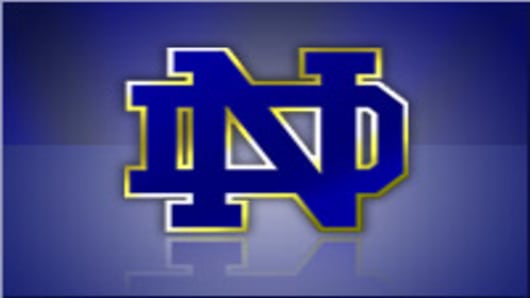This Saturday, Notre Dame plays USC. It's not the ideal matchup it has been in the past. But that doesn't mean it isn't a hot ticket. Consider some of these numbers: StubHub is telling me that the average price of a ticket sold on their Web site for this weekend's game is $438. That's down from the beginning of the season when the price for this game was $677. A huge drop, but it's still a hefty price to pay.
TicketsNow is saying its average selling price for this game is much higher at $501. And that you might see more USC fans at this game in Notre Dame Stadium than ever before. They say 44 percent of tickets purchased for this game on TicketsNow.comhave come from California residents.
Notre Dame's 1-6 season is having a some impact on demand. Take a look at this chart.
Average Price of Notre Dame Ticket:
2005: $279
2006: $358
2007: $251
Source: StubHub.com
Doesn't look like a big drop from 2005, right? Well consider the fact that the number usually drops in the final weeks of the season as Notre Dame fulfills its traditional obligations to a team like Navy. Last year, the average price at this time of year was $420.
With the game in mind, we decided to talk to Josh Berlo, an assistant athletic director at Notre Dame who heads up ticket sales. We talked to him specifically about getting a ticket for face value with the school's unique lottery system.
Darren: How is getting a ticket to a Notre Dame game different from buying a seat for any other game?
Berlo: Notre Dame has a different philosophy on access to its football tickets. One of the major components of the ticketing for Notre Dame football was the alumni lottery and its really a philosophy of inclusion and openness to give the opportunity to as many alumni as possible the opportunity to return to campus each fall to attend a football game.
Darren: So how does this per game lottery work?
Berlo: There’s an opportunity for every alumnus who makes a minimum contribution to the university ($100 to $200) and each individual is sent an application that includes all the games that we play and they can pick and choose which games they’d like to entry the lottery for. Based on some computer conducted lotteries and some random numbers we spit out a list of winners and losers of who’s going to be able to purchase tickets for that year.
Darren: How many of these tickets are available on a per game basis?
Berlo: Of our 80,000 seat football stadium, in excess of 30,000 tickets for each game go into the annual football ticket lottery.
Darren: Obviously there's big demand for the game this weekend. How many tickets were requested for this week's game?
Berlo: We have requests in excess of 60,000 thousand tickets for that pool of approximately 30,000.
Darren: People have to pay for tickets before the lottery results come out, so what do you do with that money in between the time people have to pay and when you return the money?
Berlo: Last year we refunded $8.6 million. We had an excess demand for football tickets that represents approximately 190,000 that we were not able to fulfill. The funds are utilized for university fiscal purposes and are then refunded in July and I don’t have any details on how they are utilized, but I know they are used.
Darren: There's a lot of action on the secondary market for this game. How do you guys deal with that?
Berlo: The athletic department established a few years ago a policy where tickets could not be sold above face value. It’s the mission and the goal of the university supporters and the university in general to make sure that those that are holding tickets are going to use them and it is not a mechanism to make money. So it was decided that we would do our best to track those folks down to suspend or revoke their privileges and in theory put the tickets in the hands of someone who intends to go the game. At this point I think in the history of the policy we’re well over 7,000 tickets that we’ve suspended or revoked.
Darren: The team is obviously not doing well now. Do you expect demand to go down?
Berlo: The demand always exceeds the supply. We’ve had great support and great lotteries. Like most things it does ebb and flow from time to time, but in my experience in the seven or eight years I’ve been around, demand has always exceeded supply. We've sold out 199 games as of the Duke game this fall. So I think we’ve got plenty of support out there.



